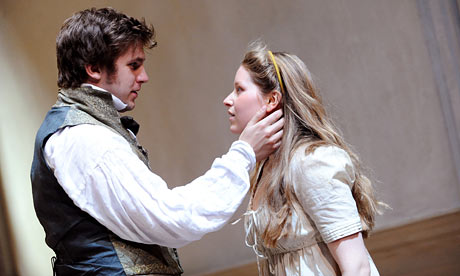“An object in motion will remain in motion until an external force is applied to it.” Such states part of Isaac Newton’s first law of motion, which applies both literally and figuratively to Tom Stoppard’s play “Arcadia,” now showing at MU’s Rhynsburger Theatre.
While much of the play involves Newton’s theories, the action of the plot (in this instance, the object) remains in captivating, intellectual motion for nearly three hours -- until the lights (the force) are dimmed and the stage is bare.
.gif) Winner of the Laurence Olivier Award for Best New play, “Arcadia” is a rare masterpiece that explores conflicts in science, class and love (to name a few). Set in both the early 1800’s and the present day, the plot shifts back and forth between the two time periods. However, in the final scene both courses of action occur simultaneously.
Winner of the Laurence Olivier Award for Best New play, “Arcadia” is a rare masterpiece that explores conflicts in science, class and love (to name a few). Set in both the early 1800’s and the present day, the plot shifts back and forth between the two time periods. However, in the final scene both courses of action occur simultaneously. The storyline merges scientific debate with romantic philosophies to reflect the moral contest between classicism and romanticism. In the 1800’s, brilliant young Thomisina Coverley (Kristen Walker) grapples with both her academic lessons and entrance into womanhood while being instructed by her philosophical tutor Septimus Hodge (Brian Scanlan). Meanwhile, her mother, the vivacious Lady Croom (Paige Sommerer) is busy entertaining (in more ways than one) the famous guests who come to visit her estate.
In the present day, author Hannah Jarvis (Caitlin Reader) stays at the Croom estate to research a mysterious hermit who supposedly lived there at the same time as Lady Croom. While residing with the Coverley family, she encounters the cocky Bernard Nightingale (Steven Buehler), whose studies have also brought him to the Croom estate.
The mystery of the lives Lady Croom, her “special” guest, the unseen Lord Byron, and Septimus Hodge unfolds as the modern day characters piece together the events that happened at the estate more than a century before – unveiling surprising revelations about both the past and the present.
In a play where dialogue completely comprises the action, the main characters had no option but to rely solely on their acting skills to engage the audience. Luckily, the majority succeeded.
Walker was cast perfectly as Thomisina. Both inquisitive and innocent, Walker effectively bridged the gap between classicism and romanticism, which her character was scripted to do. It’s clear that Walker did her research, as she effectively communicates the difficult scientific principles Thomisina studies so that audience members can try to understand them as well as she does.
As Lady Croom, Sommerer was humorously flamboyant and extravagant in manner. Her crazy antics energized scenes that were progressing more slowly during the course of the show.
Both Reader and Buehler are astute and witty. Possessing much of the stage time, the actors make their modern day characters relatable to audience members to help connect the differing time periods.
The only casting weaknesses lie in minor characters, including the modern Chloe Coverley (Merill Arens) and the 1800’s era friend of Lady Croom’s brother Mr. Chater (Nathan Bryant). Arens is too soft-spoken as Chloe, and not expressive enough in her flirtatious emotions. Also, compared to his fellow actors, Bryant sounds more like a modern college student than an English poet since he is not articulate enough in his speech.
The true genius of “Arcadia” lies in the script, which includes more nuances and details than can be understood in the first viewing. The intricate nature of the plot makes it rewarding, as more can be appreciated and learned each time audiences see it performed.
The show is a wise reflection of human nature and the clash between logic and emotions. Director Kevin Brown successfully used this attribute to direct his actors to express internal conflicts through physical gestures, which helped make the dialogue-heavy show engaging.
Because of the intellectual nature of the show and the lengthiness, many audience members left during intermission. Apparently unable to handle the thoughtfulness of the show, these specific audience members exemplified a point that Stoppard makes through the show – those unwilling to pay attention to details will traverse through life making the same mistakes as those in the past.
The thirst for knowledge characterizes “Arcadia.” Though complex, the plot is innovative and enlightening, leaving audiences thinking about the deeper meanings of the show long after they leave the theater. Stoppard writes, “It’s wanting to know that makes us matter.” “Arcadia” ensures that audiences leave the theater knowing more about the nature of humanity than they did before.


No comments:
Post a Comment